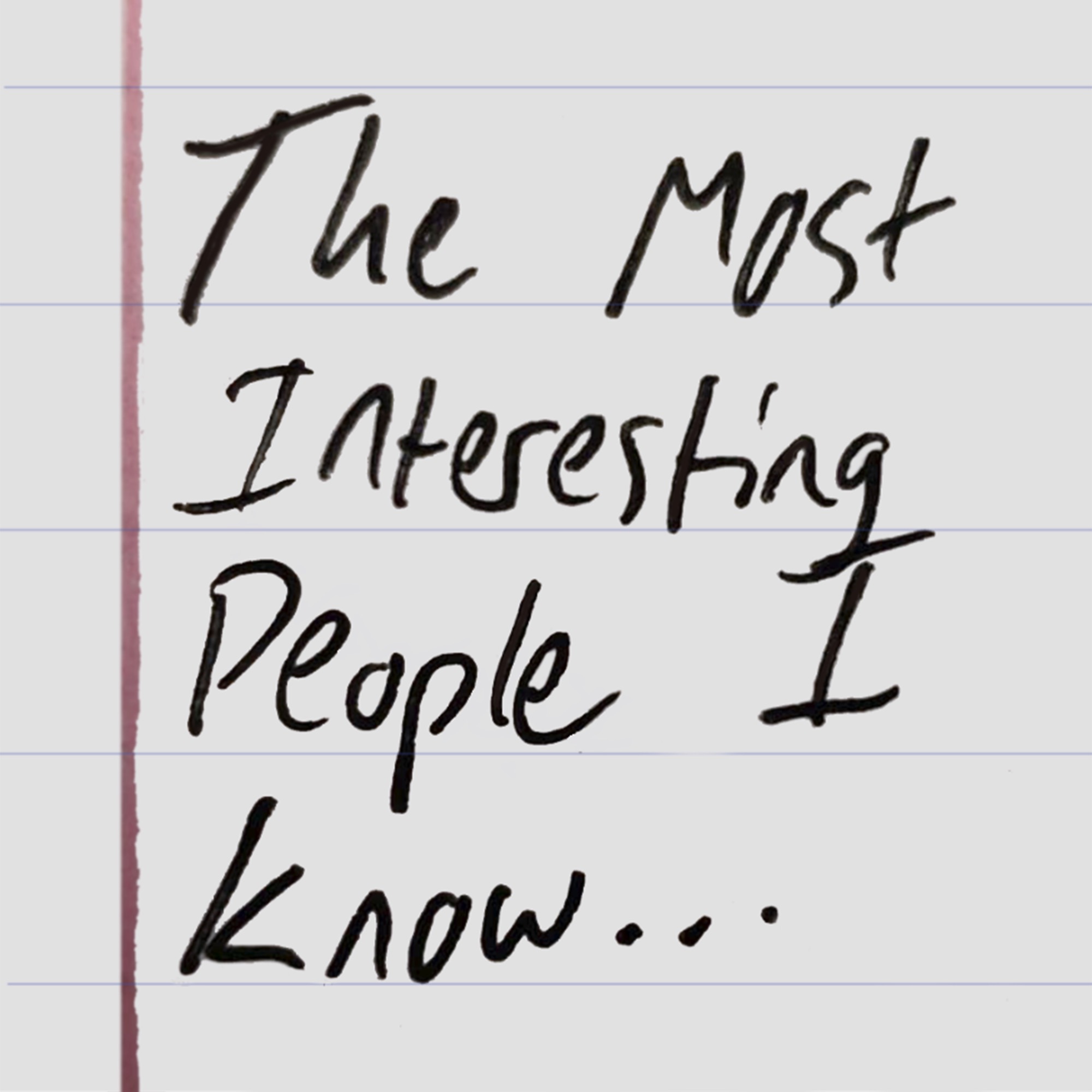Episodes
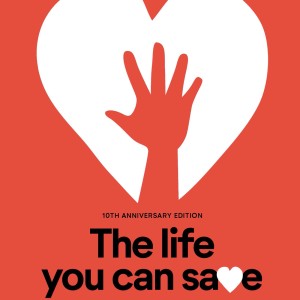
Monday Aug 10, 2020
25 - Charlie Bresler on the Lives You Can Save
Monday Aug 10, 2020
Monday Aug 10, 2020
Charlie Bresler is the Executive Director of the Life You Can Save, a nonprofit founded by Peter Singer that inspires and empowers people to take action in the fight against extreme poverty.
Charlie was previously the president of the Men’s Warehouse and a professor of clinical psychology. Later in the episode, we dig into Charlie’s path from psychology, to men’s fashion, to fighting global poverty. The inspiration for this episode is the release of the 10th anniversary edition of the book The Life You Can Save by Peter Singer. The book offers an overview of the intensity of global poverty and the related human suffering and makes a compelling case to donate more to more effective charities. Contrary to popular belief, there are charities that have proven track records of delivering effective interventions, some of which can save a child’s life for less than two thousand dollars. The new edition of the Life You Can Save is available for free in e-book and audiobook format. The audiobook is read by a number of celebrities, including Kristen Bell, Paul Simon, and Stephen Fry. In addition to the book, we discuss:
Where The Life You Can Save is now, the shallow pond thought experiment, the myth that we don't know what works in global poverty and health, why an "empathy fund" may be more sustainable, framing effective giving as an opportunity vs. an obligation, why being a doctor doesn't do as much good as we think, how Charlie's democratic socialism informs his life, why EAs aren't as radical you might expect them to be.
If you’re familiar with Effective Altruism, I’d recommend skipping to about 35 and a half minutes in. Most of the ideas we discuss for the bulk of the episode are probably familiar to you, but you may be interested in our conversation on the intersection of EA and radical politics.
Show notes:
Famine, Affluence, and Morality
Over 5M children die before they turn 5 each year
The Moral Imperative toward Cost-Effectiveness in Global Health
The Politics of War: The World and United States Foreign Policy, 1943-1945
The World the Slaveholders Made: Two Essays in Interpretation
American Power and the New Mandarins
Understanding Power: The Indispensable Chomsky
Hozier’s new protest song Jackboot Jump
Politics and the English Language
You can reach out to Charlie directly at:
Charlie@thelifeyoucansave.org

Sunday May 03, 2020
24 - Edgar Villanueva on Decolonizing Wealth
Sunday May 03, 2020
Sunday May 03, 2020
Edgar Villanueva is a globally-recognized expert on social justice philanthropy. He serves as Chair of the Board of Directors of Native Americans in Philanthropy. Edgar currently serves as Senior Vice President at the Schott Foundation for Public Education where he oversees grant investment and capacity building for education justice campaigns across the United States.
He is also the award-winning author of Decolonizing Wealth, a bestselling book offering hopeful and compelling alternatives to the dynamics of colonization in the philanthropic and social finance sectors.
In addition to working in philanthropy for many years, Edgar has consulted with numerous nonprofit organizations and national and global philanthropies on advancing racial equity inside of their institutions and through their investment strategies.
We spend most of our conversation on Edgar’s book, specifically:
How he became disillusioned with the philanthropy sector, America's refusal to engage with its history of colonialism and racism, the coloniser's mindset and how it ties to contemporary philanthropy, how people of color are left out of philanthropic spending, the 5% foundation payout requirement and why most foundation money is parked in investment accounts, a call to transfer capital back to impoverished communities, poverty in precolonial times, the potlatch ceremony, a challenge to the thesis of Decolonizing Wealth from an effective altruism perspective, the problem with the term altruism, the problems that are solved by just giving people money with no strings attached, shifting the power and choice from donors to the people they're trying to help, the ties between capitalism and white supremacy, and how to learn more and join the Decolonizing Wealth giving circle
Near the end of the episode we had some audio drop out, did what I could to piece things back together and didn't end up losing too much, but there are some awkward cuts.
If you’d like to learn more about the book visit decolonizingwealth.com. You can find Edgar on Twitter at @VillanuevaEdgar and me at @GarrisonLovely. If you’d like to get in touch directly, you can email me at mostinterestingpeople27 [at] gmail [dot] com.
Show notes:
Report: 72% of Americans rarely encounter or receive information about Native Americans
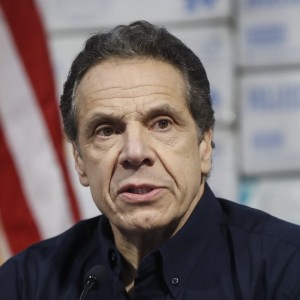
Sunday Mar 29, 2020
23 - Akash Mehta on why Andrew Cuomo is Not Your Friend
Sunday Mar 29, 2020
Sunday Mar 29, 2020
Akash Mehta is a writer and organizer from New York. He is a member of the New York City Democratic Socialists of America and helped organize UChicago for Bernie. Akash recently wrote a great article for Jacobin called Even in a Pandemic, Andrew Cuomo Is Not Your Friend. Governor Cuomo has received a lot of good press for his handling of the coronavirus crisis in New York, but his past and present decisions have made the state less prepared for this ongoing calamity. We discuss those decisions in great detail as well as:
Why Cuomo is popular and trusted right now, how his "get things done" brand obscures real ideological differences between him and the Left, why ideology does influence the response to the coronavirus, Milton Friedman's keen understanding of the politics of crises, the links between Biden and Cuomo, how Cuomo empowered Republicans in New York to kneecap progressives in his own party, his plan to cut Medicaid by billions due to his unwillingness to increase taxes on the wealthy, how he blames private hospitals for not having enough ICU beds, even though he played a substantial role in cutting 20k beds in the state, why we should provide free healthcare for all conditions, not just the coronavirus, Cuomo's prioritization of homeowners over renters, the choice we face between prioritizing the needs of the market over the needs of people, a call to join political membership groups like the DSA or the Sunrise movement, what you can do to influence the New York State budget, a plan for a left news site devoted to New York City politics, and my thoughts on the intersection between Effective Altruism and the Left.
As we discuss near the end of the episode, the changes Cuomo is pushing are part of a state budget that is due on March 31st. Cuomo has responded to public pressure by releasing people incarcerated for technical parole violations and may cave to pressure to reject these cuts. You can contact his office using this form and/or calling at 1-518-474-8390.
If you live in New York, you can find your state senator and assembly member here: https://openstates.org/find_your_legislator/
Calls to their offices opposing these cuts and supporting the proposals in #makebillionairespay could help influence billions of dollars in funding to people in great need. The site for #makebillionairespay also has guidance on how to effectively pressure your representatives: https://makebillionairespay.info/take-virtual-action
You can reach out to Akash at akvmehta [at] gmail [dot] com. As always, you can find me on Twitter @GarrisonLovely and reach out to the show at mostinterestingpeople27 [at] gmail [dot] com
Show notes
- Milton Friedman’s quote: “Only a crisis - actual or perceived - produces real change. When that crisis occurs, the actions that are taken depend on the ideas that are lying around. That, I believe, is our basic function: to develop alternatives to existing policies, to keep them alive and available until the politically impossible becomes the politically inevitable.”
- How Obama Failed: On every level, the Obama administration couldn't break with neoliberalism. We're living with its failures today.
- Everything Has Changed Overnight: The Democratic primary is no longer over. This is a historic crisis requiring nothing less than FDR-style ambition and leadership. We’ve got just the guy.
- Lancet Medicare for All Study analysis (link to original study is dead…)
- Andrew Cuomo’s Treatment of Prisoners Reveals He’s Leaving Some At-Risk New Yorkers Behind
- Cuomo orders 1,100 parole violators released from jails over coronavirus concerns
- Effective Altruism survey
- The NYC DSA’s excellent weekly email newsletter The Thorn

Wednesday Feb 26, 2020
22 - Zach Roberts on Bloomberg's NYPD and Antifascist Journalism
Wednesday Feb 26, 2020
Wednesday Feb 26, 2020
CONTENT WARNING: This episode includes descriptions of racially-motivated violence.
Zach Roberts is a photo and video journalist whose work has been published on the cover of the New York Daily News, The Observer, The Guardian and on the inside of the New York Times, TheNation.com, Al Jazeera, Washington Post, Buzzfeed and Newsweek, among others.
For the past 10 years, Zach's been on the trail covering social movements, investigating election theft and corporate crime, and most recently tracking white extremism.
Some notable events and stories he's covered are Ferguson, Occupy Wall Street, the Unite the Right Rally in Charlottesville, and over a dozen different Trump rallies. Zach has been beaten and trampled at Occupy, arrested, and had guns pointed at him in Ferguson and Charlottesville.
During our conversation we cover:
His experience with Bloomberg's NYPD during Occupy Wall Street, the legacy of that movement, how the media fails to cover protests correctly, Zach's breakup with Ralph Nader, his experience documenting the Unite the Right rally in Charlottesville, his photos of a brutal beating committed by white extremists, which contributed to a number of convictions, how the police completely failed to protect and serve in Charlottesville, the experience of covering white extremist groups, how the police have changed since Trump took office, how the media ignores stories that actually matter, the almost massacre in Richmond Virginia, white nationalist killings that aren't classified as such, and how you can be an effective anti-fascist.
You can find Zach on Twitter: @ZDRoberts and support his Patreon here: https://www.patreon.com/zdroberts. His portfolio can be found on his website: https://www.zdroberts.com/
You can find me on Twitter: @GarrisonLovely and email the show at mostinterestingpeople27 [at] gmail [dot] com
Show notes:
15 Years Ago, Protesters Took Over NYC During 2004 Republican National Convention
The Problem with “Broken Windows” Policing
Bloomberg’s disgraceful eviction of Occupy Wall Street
Video: NYPD Uses Pepper Spray, Force On Wall Street Occupiers
Occupy Wall Street’s Legacy Runs Deeper Than You Think
Larry Summers and the Secret “End-Game” Memo
Why Is the U.S. Green Party So Irrelevant?
Zach’s coverage of Unite the Right at Charlottesville
A New Face of White Supremacy: Plots Expose Danger of the ‘Base’
How Stephen Miller Manipulates Donald Trump to Further His Immigration Obsession
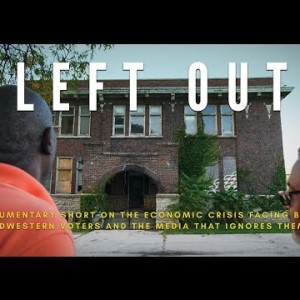
Saturday Feb 08, 2020
21 - Malaika Jabali on Identity Politics and Myths About the Midwest
Saturday Feb 08, 2020
Saturday Feb 08, 2020
Malaika Jabali is an attorney, activist, and writer based in New York. She is a contributing writer to Essence Magazine and a frequent contributor to the Guardian. Her work also appears in Current Affairs, Jacobin, the Intercept and elsewhere. Malaika is my first returning guest, and I was very happy to have her back. Since we last spoke, she has written extensively about the 2020 candidates and deepened the reporting that began with her excellent Current Affairs feature The Color of Economic Anxiety. That article won the award for best General Feature from the New York Association of Black Journalists. Last week, Malaika released her first film, Left Out, which challenges many of the assumptions about what working class midwesterners want out of their politics. The 8 minute film is available for free on YouTube and well worth your time. We discuss it as well as:
How economic anxiety can depress voter turnout, the underrated importance of people who voted for Obama but didn’t turn out in 2016, assumptions made about midwesterners, the myth of the moderate Democrat, Malaika's advice for 2020 candidates, the lack of diversity in early primary states and how it impacts the nominating process, why black voters don't like Pete Buttigieg, Joe Biden's implosion, Bernie's campaign and rhetoric around race, whether Bernie is a class reductionist, how he could be better at speaking to the intersections of race and class, identity politics as it was originally conceived and how it has been misappropriated, the false choice between emphasizing identity based oppression and solidarity, and the lack of representation in socialist groups like the DSA.
You can find Malaika on Twitter: @MalaikaJabali and me: @GarrisonLovely
I’ve also created an email address for the show. I welcome any feedback, guest ideas, or just a hello at mostinterestingpeople27 [at] gmail [dot] com
Show notes:
Malaika’s work:
Pete Buttigieg has a race problem. So does the Democratic party
Other links:
Economic anxiety vs racial resentment:
For elites, politics is driven by ideology. For voters, it’s not.
Most Iowa Democratic caucus-goers support a single-payer health-care plan
Experiments show this is the best way to win campaigns. But is anyone actually doing it?
How Bernie Sanders Evolved on Criminal Justice Reform
Joe Biden: “I love kids jumping on my lap”
Phillip Agnew's 'With These Hands' – Powerful Bernie Rally Moment
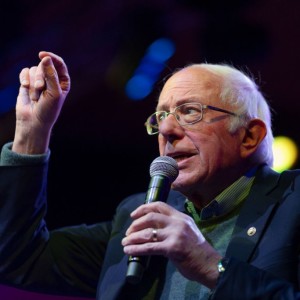
Thursday Jan 23, 2020
20 - Meagan Day on the Case for Bernie Sanders
Thursday Jan 23, 2020
Thursday Jan 23, 2020
Meagan Day is a staff writer at Jacobin magazine. Her work has also appeared in The New York Times, The Guardian, Vox, Mother Jones, The Week, The Baffler, In These Times, n+1, and elsewhere. Her nonfiction book Maximum Sunlight was excerpted in the Best American Nonrequired Reading 2017. She has co-authored a book with Micah Uetricht called Bigger than Bernie: How We Go from the Sanders Campaign to Democratic Socialism. Look for it in late April.
Today, we make the case for Bernie Sanders: why he is the most electable candidate and the one we should be most excited about. We dig into the data and the theory behind why a Bernie nomination would likely lead to a Bernie presidency. We also discuss why the case for Joe Biden’s electability falls apart and address some of the strongest arguments against Bernie.
We spend the first 13 or so minutes discussing the allegation that Bernie told Elizabeth Warren that a woman couldn’t win the presidency. If you’re familiar with this dispute, feel free to skip ahead.
If this episode inspires you, you can get involved by visiting berniesanders.com/volunteer. Of course you can also make a donation at berniesanders.com. There is also the BERN app which helps you build grassroot support among your friends and family. Find the app at app.berniesanders.com
We’re entering the most critical period of the Democratic primary. The winner of the Iowa caucus on February 3rd is likely to become the Democratic nominee, so if you’ve been on the sidelines, now’s the best time to get involved.
Show notes:
Meagan's writing:
How an Anti-Sexist Candidate Got Smeared as Sexist
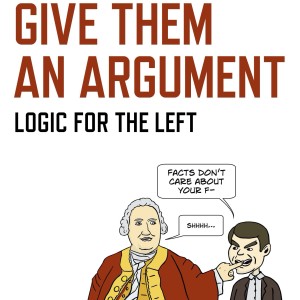
Sunday Jan 05, 2020
19 - Ben Burgis on Reclaiming Logic for the Left
Sunday Jan 05, 2020
Sunday Jan 05, 2020
Ben Burgis is a philosopher and logician who lectures at Rutgers University. He has a segment on the Michael Brooks Show called the Debunk and writes a weekly column for Jacobin magazine. We spend most of the show talking about his book Give Them an Argument: Logic for the Left, which challenges the left to take logic more seriously.
Ben’s Twitter: https://twitter.com/benburgis?lang=en
And Patreon: https://www.patreon.com/benburgis
We also discuss:
The aesthetic of reason being adopted to defend bad arguments, why the left needs to make better arguments for their positions, the limits of logic in persuading people whose material interest differ from ours, why left principles for redistribution don't stop at our borders, conflict vs mistake theory in explaining the motivations of our political opponents, and where each theory may apply, the importance of interpreting our allies' arguments charitably, Ben's thoughts on moral philosophy, why tankies are bad utilitarians, double standards for Marx vs other problematic philosophers from history, Jeremy Bentham’s good takes, state monopoly on violence and police reforms, where Ben disagrees with the left, the problems with a radically empirical worldview, whether utilitarianism takes you to implausible places, and how to balance epistemic humility with the need to beat confident bullshitters.
Links:
Life expectancy going up under mao
Deconstructing the ‘Ferguson Effect’ (Note: I think the evidence for this is more mixed than I thought at the time of the interview)

Monday Dec 09, 2019
Monday Dec 09, 2019
Marcus Davis is the co-founder and lead researcher at Rethink Priorities, a nonprofit conducting foundational research on neglected causes within the Effective Altruism movement. Marcus also co-founded Charity Entrepreneurship and Charity Science Health. Rethink Priorities has put out a lot of impactful research on topics like nuclear war, invertebrate sentience, and ballot initiatives, in addition to taking on the crucial task of conduc ing the annual Effective Altruism survey. They’ve managed to do a lot with an annual budget of less than half a million dollars and are accepting donations. Residents in the US, UK, Canada, Germany and Switzerland can make tax-deductible donations here: https://www.rethinkpriorities.org/donate
We discuss:
Rethink Priorities’ goals, how much we should worry about nuclear war, fish stocking, the promise of ballot measures for passing progressive policies and animal welfare protections, recent ballot measures on psychedelic decriminalization, determining the sentience of animals, whether octopuses are aliens, who makes up the Effective Altruism movement, how to reach people who aren't young STEM grads, how less effective interventions can still be improvements over the status quo, the ways in which EA doesn't reflect society at large and steps that could be taken to rectify that, and what Rethink Priorities can do with your money
Show notes:
Luisa Rodriguez’s series on nuclear war
The Doomsday Machine by Daniel Ellsberg
Rethink Priorities’ presentation on ballot initiatives
Psychedelic ballot initiatives
Nagel’s paper “What Is It Like to Be a Bat”
David Foster Wallace’s essay “Consider the Lobster”
Other Minds by Peter Godfrey-Smith
Octopuses may be aliens: A controversial study has a new spin on the otherworldliness of the octopus
Article on GiveDirectly’s disaster relief program: Google’s unusual plan for disaster relief: just give survivors money

Sunday Nov 24, 2019
17 - Rob Scott on Teaching College in Prison
Sunday Nov 24, 2019
Sunday Nov 24, 2019
Rob Scott is the Executive Director of the Cornell Prison Education Program (CPEP), which he has led since 2013. Under his leadership CPEP has expanded operations from one to four prisons and now serves over 200 incarcerated students. Rob also helped form state and national coalitions for higher education in prisons. In 2016, he was recognized as one of 10 White House “Champions of Change” for his work with CPEP.
In college, I co-founded the Prison Reform and Education Project (PREP) and got to know Rob, who eventually served as our faculty adviser. As we discuss, I was also a volunteer teaching assistant with CPEP. Rob was one of the first people who came to mind when I conceived of this podcast, but has been a little busy being a new father the past few months, so this conversation was a long time coming.
We discuss:
How Rob got started in prison education, how prison education has gone from boot-strapped projects done in the shadows to flagship programs supported by major universities, how the era of Pell grants in prisons was not all it's cracked up to be, how CPEP works, why crime may have declined, the power of language in our self concept, the experience of teaching in prison, a better definition of crime, the limitations of attempting to change oppressive institutions from the inside, the tenuous state of Pell grants for incarcerated people, Rob's complicated stance on prison abolition, the small “d” democratic origins of incarceration as punishment, and restorative justice and alternatives to incarceration.
Rob is an incredibly thoughtful and selfless guy, and his opinions consistently surprise me. I hope you enjoy this episode as much as I did.
Links:
Reasonable Doubt: A New Look at Whether Prison Growth Cuts Crime
My very angry tweet thread about Bret Stephens’s stupid take on the 1994 Crime Bill
Games Criminals Play: How You Can Profit by Knowing Them
Shane Bauer’s article: My four months as a private prison guard
Foucault’s book Discipline and Punish
NPR: Former Physician at Rikers Island Exposes Health Risks of Incarceration

Friday Oct 25, 2019
Friday Oct 25, 2019
Andrés Gómez Emilsson is the Director of Research at the Qualia Research Institute (QRI). QRI aims to systematize the study of consciousness, to do to consciousness what chemistry did for alchemy. He holds a master’s degree in computational psychology and an undergraduate degree in symbolic systems from Stanford University, where he co-founded the Stanford Transhumanist Association.
This is a pretty wild episode touching on some of the most important and mind-bending ideas I’ve ever encountered, centered around a single question: why can't we be happy all the time?
We get into some pretty wacky territory but I think Andrés does a good job of making this approachable to somebody who has never encountered these ideas before.
We use the term intuition pump a few times, this is a word coined by the philosopher Daniel Dennett to describe a thought experiment that helps the thinker use their intuition to develop an answer to a problem.
We cover:
Andrés’s life project to overcome all the mechanisms that prevent us from being happy all the time, the hedonic treadmill, the promise of anti-tolerance drugs, the influence of genetics on our ability to be happy, how electric stimulation of the brain doesn’t lead to tolerance the way drugs do, wireheading done right and wrong, three types of euphoria, the social gulf between Bay Area life-optimizers and everyone else, negative utilitarianism, the worst and best experiences humans have, the therapeutic and scientific potential for 5-meo-dmt, psychedelics as Effective Altruism’s cause X, the best way to use ibogaine for treating opiate addiction, a better approach to using opiates for pain management, and why people report wacky new beliefs after ego dissolving psychedelic experiences
Links:
Simon and Garfunkel song: Richard Cory
Andrés’s article: Wireheading Done Right: Stay Positive Without Going Insane
84% of drug users who report a bad trip say they benefited from the experience
NYMag: Psychedelic Mushrooms Cured My Cluster Headaches
NY Public Radio interview on how Harry Anslinger started the war on drugs
The Qualia Research Institute (QRI)
QRI executive director Mike Johnson’s blog: Opentheory.net

